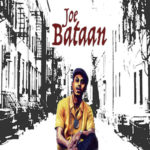

No recording artist has more impeccable street credentials than Joe Bataan, the originator of the New York Latin Soul sound.
Joe Bataan was born Bataan Nitollano–and although he eventually came to be known as the King of Latin Soul, his ancestry is actually African-American and Filipino, a heritage he would celebrate in his music down the road. He grew up in the 103rd St. and Lexington Ave. part of East Harlem where he briefly led the Dragons, a local Puerto Rican street gang, before being sent to the Coxsackie Correctional Facility to serve time for a stolen car charge.
Upon his release in 1965, he turned his attention to music and formed his first band, Joe Bataan and the Latin Swingers. Bataan was influenced by two musical styles: the Latin boogaloo and African American doo-wop. Though Bataan was neither the first nor only artist to combine doo-wop-style singing with Latin rhythms, his talent for it drew the attention of Fania Records. After signing with them in 1966, Bataan released “Gypsy Woman” in 1967 (the title track is a Latin dance cover of “Gypsy Woman” by The Impressions). He would, in full, release eight original titles for Faniawhich included the gold-selling Riot! These albums often mixed energetic Latin dance songs, sung in Spanish, with slower, English-language soul ballads sung by Bataan himself.
Disagreements over money with Fania Records head Jerry Masucci led Bataan to eventually leave the label. While still signed to Fania however, Bataan secretly started Ghetto Records, a Latin music label which got its initial funding from a local gangster, George Febo. Bataan produced several albums for other artists, including Papo Felix, Paul Ortiz and Eddie Lebron.
In 1973, he helped coin the phrase “salsoul”, lending its name to his first post-Fania album. Along with the Cayre brothers, Kenneth, Stanley, and Joseph, he co-founded the Salsoul label, though later sold out his interest. He recorded three albums for Salsoul and several singles, including “Rap-O Clap-O” from 1979 which became an early hip hop hit. After his 1981 album, Bataan II, he retired from music-making to spend more time with his family and ended up working as a youth counselor in one of the reformatories he himself had spent time in as a teenager.
In 2005, Bataan teamed up with producer Daniel Collás to break his long hiatus with the release of “Call My Name,” a well-received album recorded in New York for Spain’s Vampisoul label.
In early 2009, Bataan was featured in the Kenzo Digital-produced “City of God’s Son.” Bataan was featured as the narrator of the story, playing the part of an older Nas reflecting upon his youth in the street with cohorts Jay-Z, Ghostface Killah, Biggie and Raekwon. He is also featured in the 2014 documentary “We Like It Like That” which tells the story of Latin Boogaloo music.
Favorite vocalist and songwriter